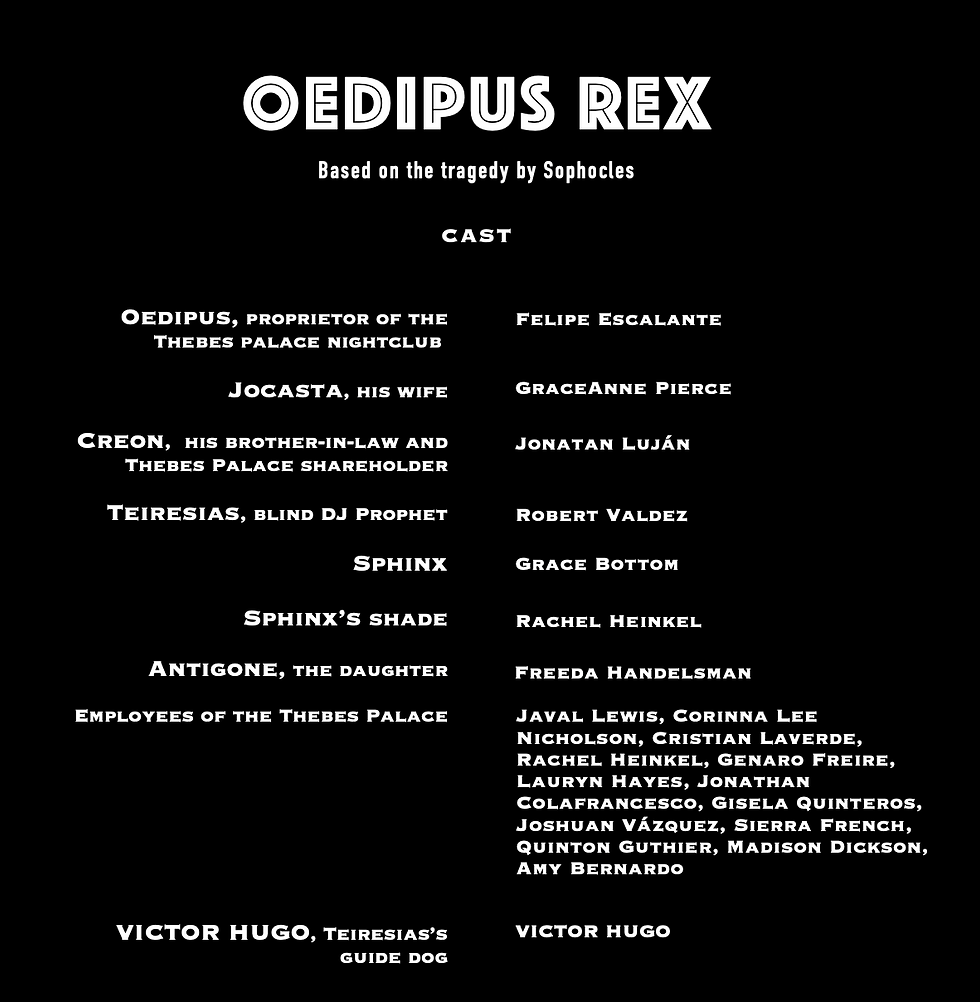“dance’s production values…are off the charts.”
"an inventive but faithful update of Sophocles’s tragedy Oedipus Rex.”
"The story, based on Sophocles’s 2600-year-old tragedy, unfolds rapidly and clearly, a result of founder and artistic director Felipe Escalante’s visceral, pristine choreography and masterful staging."
"a visual event and a work of creative intelligence that should be seen”
OEDIPUS REX

PREMIERED SEPTEMBER 27, 2022
NEW YORK LIVE ARTS
Fate, murder, incest, truth, justice, power -- these are the themes of Sophocles’ 2,650-year-old tragedy, Oedipus Rex, reimagined by Tabula Rasa Dance Theater as a dance piece and resituated in a contemporary, fictional nightspot called the Thebes Palace. Felipe Escalante, founder and artistic director, was drawn to this material because, like other plays of the time, Oedipus Rex gives audiences an opportunity to reflect on ethics and social responsibility.
Since its founding in 2018, Tabula Rasa Dance Theater has built a reputation for addressing social-justice concerns, including sexual assault, conversion therapy, misogyny, labor exploitation, immigration, invisible disabilities, and more. While activists have alleviated the stigma attached to victims of rape and gender-based violence, the traumas of incest survivors, by comparison, remain shrouded in silence and shame. Oedipus Rex calls attention to this troubling fact and to the deleterious effects the taboo continues to have on individuals, society, and human evolution.
“Oedipus Rex subsumes several of the issues I have explored previously,” Escalante says. “Among the points this version of Oedipus Rex makes is that incest is indefensible. The past actions of Oedipus’s father Laius, who raped his student Chysipuss, set in motion a series of family disasters. We know that sexual abuse is often a self-perpetuating phenomenon with consequences that can continue indefinitely. How can this cycle of abuse be transformed?”
Escalante’s ideas echo those of Freud, who, after analyzing Oedipus Rex, anthropology, zoology, and his own patients, concluded that incest is “antisocial—civilization consists in its renunciation.” Likewise, Claude Levi-Strauss believed that social structures depended upon exogamy—on incest remaining forbidden. Supporting these ideas, The Atlantic has reported that, “Incest is the single biggest commonality between drug and alcohol addiction, mental illness, teenage and adult prostitution, criminal activity, and eating disorders.”
Tabula Rasa Dance Theater’s rendition of the story takes place in 2020. As the COVID pandemic wreaks havoc on his business and his workers, Oedipus, proprietor of the Thebes Palace nightclub, frantically searches for vital financial information that could save them. But these missing records were the property of the club’s previous owner, Laios, now deceased. Though valiant, Oedipus’s quest for the truth leads only to the terrible fulfillment of an ancient curse. In Escalante’s inventive but still faithful updating of the myth, the blind oracle Tiresius is a celebrity DJ and the Sphynx, whose riddle Oedipus famously solved, makes a cameo. This Sphynx, however, has the head of an animal and the body of a woman, reversing the traditional morphology.
Using up-to-the-minute technology, including lasers and A.I., and an original electronic score, TRDT presents its most ambitious program to date. Though complex, the narrative is expressed with clarity, a result of Escalante’s pristine, visceral choreography. From the start, TRDT has been lauded for its organically sensual, propulsive style, grounded in ballet, modern, and folkloric dance techniques and the close observation of everyday human gestures and animal locomotion. Articulating all components of the face and body, Escalante creates a new form of movement that is at once supremely disturbing and sublimely beautiful.
Oedipus Rex will be performed by 16 dancers of varying genders, ages, and backgrounds. Hailing from 8 different countries, including Mexico, the UK, Jamaica, Puerto Rico, Argentina, the Dominican Republic, and the U.S., many of these artists identify as people of color.

















